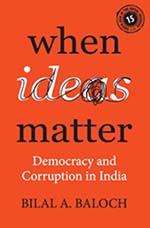In his debut volume, When Ideas Matter: Democracy and Corruption in India, Bilal A Baloch seeks to underscore the salience of ideology in shaping, dictating, and motivating the political elite’s behaviour. Political analysts have conventionally focused on material motivations behind elite political behaviour during the course of an electoral cycle. However, to what extent executive action is determined by ideational frameworks of those in power has largely remained an under-explored theme. This is especially the case when it comes to analysing the political responses to any credibility crisis that the executive may have to face. It is this research gap that the author tries to bridge by providing and chartering ideational motivations behind executive action during moments of crisis between elections.
During any crisis, the political, social, and economic balance get disrupted and so does the comfort this predictability tends to offer to the political class. The uncertainty thus induced can create an opportunity to reconfigure the body politic, as it provides rival elites a chance to marshal their ideological resources to wade through the crisis. In a refreshing reassessment through the prism of constructivism, this work accords primacy to ideas. It nudges the reader to go beyond a superficial understanding of elite political behaviour as something characterized by a singular focus on achieving their narrow, yet stable, political interests.

